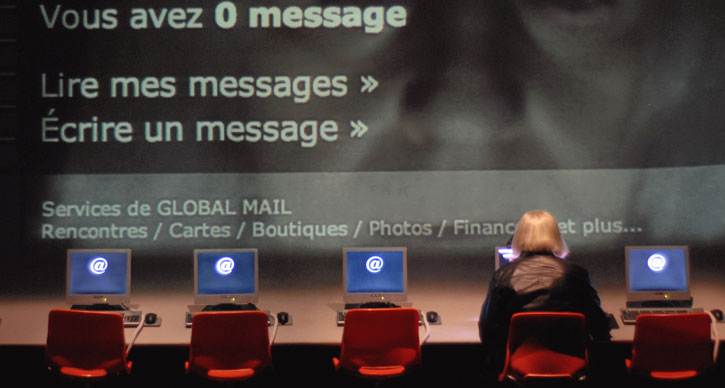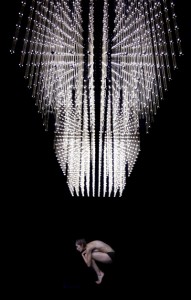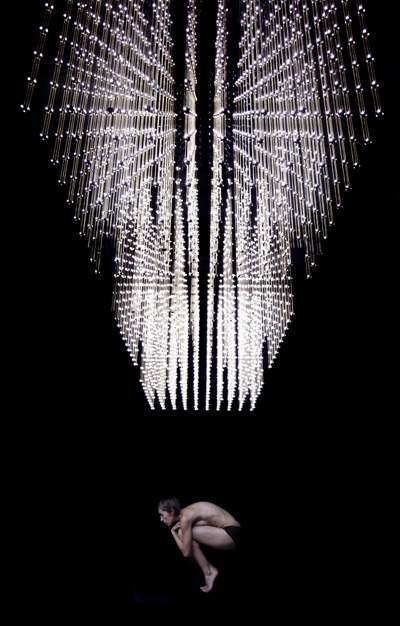5 Things to Know About The Andersen Project
1. Lepage initially created the role that is now performed by Yves Jacques, his “go-to” person for his one-man shows (Jacques was also the actor in Far Side of the Moon in 2005). The play is multi-layered and, like 08/09 Season’s Complicite, enjoyable on many levels – either at the top-level story or digging deeper into the meaning at its core.
2. Jacques plays all three main characters: Frederic, an albino rock lyricist from Montreal who heads to Paris to write the libretto for a children’s opera based on a Hans Christian Andersen story; Arnaud, the opera company’s fast-talking administrator whose personal life is unraveling due to his sexual obsessions; and Rashid, a Moroccan janitor who mops up after clients at a peep show that is located on the first floor of the same building that houses the apartment Frederic is subletting.
3. An example of the multi-layered structure: Lepage was commissioned to write a piece about Andersen to commemorate the 200th anniversary of his birth. His story is about a man who is commissioned to write a libretto for a children’s opera about Andersen. Two of Andersen’s fairy tales are woven into the script. The Dryad is about a tree nymph who sacrifices a long life in the woods for a single day in Paris – a parallel to the librettist, who is seeking artistic validation outside of his own country.
4. Those who have traveled in France will see many connections to what makes the French, well, French. There’s an opening monologue by the opera director, Arnaud, that is breathtaking in its scope and humor – nearly 2,000 words run together in a rambling yet coherent style that only the great storytellers like Spalding Gray or Garrison Keillor can accomplish. The monologue is performed with a strong accent, and every word is not intended to be understood — it’s meant to give a flavor of the character and his obsessive personality.
5. The piece is in both English and French (with supertitles). The constantly shifting projections and stagecraft make the technical aspects of the production at least as fascinating as the story itself.
Ultimately, The Andersen Project is really about an artist searching for validation and fame, unraveling relationships, and dealing with personal demons. The story itself is accessible in that The Andersen Project focuses on larger life issues that virtually everyone deals with at some point and can relate to in multiple ways.
See The Andersen Project March 15-17 at the Power Center.
People are Talking: UMS Night School – Session 4
UMS Night School is a free and open to the public series of “classes”, which include a 30-minute discussion of each performance in Pure Michigan Renegade, plus a 60-minute intro session for the next performance on the series. You’ll find follow-up conversation, coverage, and materials here on the Lobby.
 See someone with this button? Start a conversation about ‘renegade’ works.
See someone with this button? Start a conversation about ‘renegade’ works.
SYLLABUS
HOMEWORK
“Required Reading” and “Required Watching” from Malcolm Tulip, Associate Professor of Theatre at U-M
1. The Turnip Princess: a newly-discovered fairy tale
“Once upon a time, the historian Franz Xaver von Schönwerth collected fairytales in Bavaria, which were locked away in an archive until now.”
2. Interview with Robert Lepage for Theatre Music Canada.
In Lypsinch (2007) Lepage intends to “show us a mosaic of human struggles for identity, to assemble a composite portrait of contemporary society voicing over and dubbing out our primal emotional needs. Lepage wants to make us aware of how we control and doctor the sounds surrounding us to cover up the voices of those in genuine need.” via Village Voice
3. Director Robert Lepage Speaks on what inspired him to create The Nightingale & Other Short Fables, a collection of works by composer Igor Stravinsky that made its world premier in October 2009.
4. More about The Andersen Project
A slideshow of images from the production
Preview in Paris Voice: “the piece is not a retelling of any one of Anderson’s tales but rather an open-ended study, undertaken to examine, create around and perhaps finally understand better both the creator and his work.”
5. More about Hans Christian Andersen
The Hans Christian Andersen Center (with complete works)
The Dryad
The Shadow
Elsewhere on the Lobby:
Our interview with The Andersen Project’s lead actor Yves Jacques, and 5 Things to Know About The Andersen Project.
YOU SUGGESTED…
We’ll add your suggestions for further reading, listening, and watching here.
What did you think of this session of Night School? What’s still not making sense? What are you excited about?
Renegade Series will shake up your mud months
Some renegades: 1. Einstein on the Beach and 2. Random Dance.
A friend from Minneapolis was visiting earlier this summer, and we got to talking about the dreaded “mud months” up here in the icy north—February, March, alas, even April. Our friend mentioned that she’d spent a week in Arizona last February, but when I said I envied her, she shook her head. “Actually,” she said, “I cut my trip short. I couldn’t wait to get back.”
“What made you do that?”
The cultural life, she said. “There’s no cultural life down there.”
With apologies to the Heard Museum and Ballet Arizona, I think she’s got a point. And I’ve promised myself that this year, no matter how bad it gets, I’m not going to complain when it’s mid-March and I’m shoveling snow for the third time in a week, because the cultural offerings in Ann Arbor more than compensate. (Of course nothing about winter seems bad right now, so long as there are no mosquitoes.)
I’m actually looking forward to the mud months of 2012, because that’s when UMS—in what’s either a brilliant move or a potentially ruinous gesture of faith in the weather gods—is presenting its Renegade series. For me it’s the most tantalizing thing on offer this season, and I’ll be tracking it here on the Lobby, hoping to answer some of the questions I’ve long had about the process of art and art-making, and what makes some artists true outposts of genius and others mere followers. The series starts in January with a reconstruction of the 1976 opera Einstein on the Beach and winds up in late March with the San Francisco Symphony’s “American Mavericks” series, and in between covers a wide and intriguing arc of genres and eras. Beethoven, Gesualdo, Robert Lepage, Jessye Norman, Meredith Monk, Robert Wilson, Philip Glass—they’re all part of it, and they’ll all be here, in spirit or person, as we hunker down under Michigan’s gray skies and count the days until the crocuses bloom.
Because he has as much to do with the evolution of this series as anyone on the planet, I’m starting my personal Renegade “journey” with UMS Programming Director Michael Kondziolka:
LS: What’s the genesis of the Renegade series?
MK: I’ve been having a conversation for 10 years about Einstein on the Beach. And I was also having a conversation with the San Francisco Symphony about a remount of their American Mavericks festival—the first one they did was 10 years ago, in San Francisco. Both of these conversations were long-term and ongoing. And there was a moment when I realized, “Huh! It appears that both of these projects are going to land in the same season.” And when I realized that, I started thinking about the commonalities.
The American Mavericks festival is really all about Michael Tilson Thomas’s vision for a certain kind of American sensibility and “mavericky-ness” when it comes to orchestral music composition—what it means to be American, and what it means to be an innovator and an experimenter. And how can that not in some way relate to Einstein on the Beach, which is, of course, an American work of music, theater, or opera that very much embodied those same ideas of risk-taking, innovation, scale, in creating something really new.
That, strangely enough, collided with another moment that I had last season, where I’m sitting there listening to Pierre Boulez talk about his life, his ruminations on the 20th century, and his role in that. And a student asked a really wonderful question about what the new electronically based media means for music and composition. And Boulez said, “Je ne suis pas un prophète.” “I’m not a prophet. ” And he started to expound on artistic works that are truly important, that are game-changers—works we could never, ever have possibly anticipated, and once we’ve experienced them, could never imagine living without. This was his definition for something that’s truly important.
And I guess it was that statement from such an important intellectual, about art and culture, and these two projects that were long-term conversations, coming together and forming the possibility of a thread of performances devoted to this idea of work that really has changed the direction of the form.
LS: I like the term “game-changers.”
MK: It also felt very zeitgeisty to me. That these things came together at a time when our popular discourse, and our popular political discourse, is just polluted with vocabulary about innovation. “Innovating our way out of the difficulties that we face today.” “Being a maverick.” “I’m the real maverick.” All of this bullsh!t that’s kind of like wallpaper, but there’s no real there there. And of course there are lots of examples of real mavericks, of people who are really innovating, but it also seems kind of … cheap. We’re cheapening the meaning of some of these ideas, of what it means to be a real change-agent.
LS: Why “renegade”?
MK: Ultimately we wanted to choose a word that hasn’t been overused, a word that maybe made people feel both a little bit curious and a little bit uncomfortable. I like the word, because it toggles between the artists, their artistic output, and the audience. What does it mean if you’re an audience member who chooses to go to these sorts of events? Are you a little bit of a renegade? Are you taking a risk? How do you feel about taking that risk, and what do you get out of taking that risk? As consumers of the arts—as listeners and observers—it is the moments when we take risks, or step into something that we have no idea what it is, and are completely bowled over and changed, that matter. Period.
LS: In an ideal world, what do you hope audiences might take away from this?
MK: In a dream world, I want the takeaway to be something really simple. I want people to leave the experience with some sense of that quality of innovation, or change-agency, or specialness, that defines the work as part of this series.
LS: You start with a bang—Einstein on the Beach—and end with another bang, the San Francisco Symphony’s Mavericks series. So how did you decide to flesh out the middle?
MK: How did I want to fill in that time between those two bookends (which is what we’re calling them)? The one thing that was really important to me was that it not focus only on work of the last 50 years. I didn’t want this to feel like a quote-unquote contemporary music series. I wanted to tell a much larger story about moments of extreme change. So I asked Peter Phillips of the Tallis Scholars to put together a Renaissance mavericks program. And we’ve included the Hagen String Quartet’s all-Beethoven concert as a wonderful way of creating an opportunity to understand how Beethoven really changed classical music aesthetics. That’s an obvious concert to include in a series like this. I think Beethoven’s the ultimate maverick.
LS: Beyond just having an interesting cultural experience, and coming away saying, “Wow, I was there for that,” does a series like this have the potential to change our culture by changing the audience? In the best of all possible worlds, how might this shake people up? What might they get from this that goes beyond just the bragging rights, and the curiosity factor?
MK: Obviously, if entering into an unexpected experience opens those kinds of ideas up in an audience member’s mind, that for me would be a very important, possibly transformative takeaway—because we’re reminded, ultimately, of the intrinsic value of the arts and not just the instrumental value of the arts. Now: is that any different from the experience I want people to have when they go to the all-Brahms program with the Chicago Symphony? Probably not.
LS: It does seem that when you’re packaging this as “renegade,” you’re focusing on the process of creating this art, rather than just, “Let’s go hear these great works that are part of the canon.” I mean, how did they get to be part of the canon in the first place?
MK: Exactly.
LS: And what does that mean for us, and how and where we need to move our culture forward?
MK: That’s right. I think you’re right. I also think that accessing a lot of work really ultimately has everything to do with giving yourself permission. Einstein on the Beach, for example, is a five-plus hour work without an intermission …
* * *
In my next post: More from Michael Kondziolka on Einstein on the Beach.
What do you think? Do renegade works fill audiences with renegade spirit? Have you attended a ‘renegade’ work?
11/12 International Theater Series
This year’s International Theater Series features three productions at the Power Center. The series begins with Ireland’s acclaimed Gate Theater Company performing a double-bill of two one-act plays by Samuel Beckett, Endgame and Watt. As previously announced, the series continues with Einstein on the Beach, the seminal opera by Philip Glass and Robert Wilson with choreography by Lucinda Childs. Considered one of the most remarkable performance works of our time, this performances launches a world tour of what will likely be the last reconstructions of this work designed and led by its original creators. Closing the series is The Andersen Project, a solo performance created by Canadian theater visionary Robert Lepage and performed by Yves Jacques that explores sexual identity, unfulfilled fantasies, and the thirst for recognition and fame through Hans Christian Andersen’s timeless fables.
Subscription packages go on sale to the general public on Monday, May 9, and will be available through Friday, September 17. Current subscribers will receive renewal packets in early May and may renew their series upon receipt of the packet. Tickets to individual events will go on sale to the general public on Monday, August 22 (via www.ums.org) and Wednesday, August 24 (in person and by phone). Not sure if you’re on our mailing list? Click here to update your mailing address to be sure you’ll receive a brochure.
Samuel Beckett’s Endgame and Watt
Gate Theatre of Dublin
Michael Cogan, director
Thursday, October 27, 7:30 pm
Friday, October 28, 8 pm
Saturday, October 29, 8 pm
Power Center
Straight from Ireland comes the Gate Theatre, largely considered the interpreter of Beckett in the world. Endgame, like Waiting for Godot, is considered one of Beckett’s most important works, written in a style associated with the Theatre of the Absurd. The bizarre adventures of Watt (a novel written while Beckett was in hiding during World War II) and his struggles to make sense of the world around him is told with elegant simplicity, immense pathos, and explosive humor. This week-long residency will be accompanied by a week-long festival of the complete Beckett works on film.
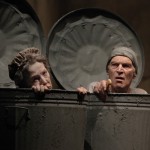
Philip Glass & Robert Wilson’s Einstein on the Beach
Lucinda Childs, choreographer
Friday, January 20, 7pm
Saturday, January 21, 7pm
Sunday, January 22, 2pm
Power Center
“The most beautiful thing we can experience is the mysterious.” — Albert Einstein
Widely credited as one of the greatest artistic achievements of the 20th century, this rarely-performed work will be reconstructed for a major international tour (including the first North American presentations ever held outside of New York City) nearly four decades after it was first performed and 20 years since its last production. Non-narrative in form, the work uses a series of powerful recurrent images as its main storytelling device, shown in juxtaposition with abstract dance sequences created by American choreographer Lucinda Childs. Prior to the production’s final technical rehearsals and world premiere in Montpelier, France, UMS will host the creators, musicians, performers, and crew for Einstein for three weeks as they reconstruct and rehearse the work for what is likely to be the final world tour designed and led by its creators. These early preview performances will be the only opportunity to see Einstein on the Beach in the Midwest.
Click the video below to watch some excerpts from Einstein on the Beach with audio commentary from collaborator Robert Wilson.
The Andersen Project
Ex Machina
Robert Lepage, artistic director
Thursday, March 15, 7:30 pm
Friday, March 16, 8 pm
Saturday, March 17, 8 pm
Power Center
Filled to the brim with his trademark humor and visual and technological brilliance, this off-the-wall masterpiece by Canadian theater visionary Robert Lepage stars Yves Jacques (Far Side of the Moon) in a one-man tour-de-force about a Canadian writer from the rock-and-roll milieu who is unexpectedly commissioned by the Opera Garnier in Paris to write a libretto for a children’s opera. Freely inspired by the timeless fables written by Hans Christian Andersen, who as it turns out, didn’t really like children, as well as anecdotes from the author’s personal diaries, The Andersen Project keenly explores unraveling relationships, personal demons, the thirst for recognition, and compromise that comes too late.
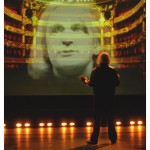
Return to the complete chronological list.
Renegade Series
Renegade
The focus on “renegades” in the 11/12 season examines thought-leaders and game-changers in the performing arts and encompasses performances that are part of the UMS International Theater Series, Choral Union Series, Divine Voices, Dance Series, and the Chamber Arts Series. Performances under this umbrella will take place in a ten-week period from January – March 2012 and include:
- Philip Glass & Robert Wilson’s Einstein on the Beach
- From the Canyons to the Stars, performed by the Hamburg State Symphony
- The Tallis Scholars, performing Tenebrae Responses by renegade Italian Renaissance composer Carlos Gesualdo
- Random Dance, a company started by Wayne McGregor , the resident choreographer at The Royal Ballet, Covent Garden, whose groundbreaking collaborations across dance, film, music, visual art, and science is evident in the company’s presentation of FAR
- Robert Lepage’s The Andersen Project, a solo performance created by this Canadian theater visionary that explores sexual identity, unfulfilled fantasies, and the thirst for recognition and fame through Hans Christian Andersen’s timeless fables
- The four concerts of the San Francisco Symphony’s American Mavericks festival. In addition to the three orchestral concerts noted in the Choral Union Series, members of the San Francisco Symphony will present a chamber music concert to close both the American Mavericks festival and the UMS focus on Renegades.
Subscription packages go on sale to the general public on Monday, May 9, and will be available through Friday, September 17. Current subscribers will receive renewal packets in early May and may renew their series upon receipt of the packet. Tickets to individual events will go on sale to the general public on Monday, August 22 (via www.ums.org) and Wednesday, August 24 (in person and by phone). Not sure if you’re on our mailing list? Click here to update your mailing address to be sure you’ll receive a brochure.
Return to the complete chronological list.


